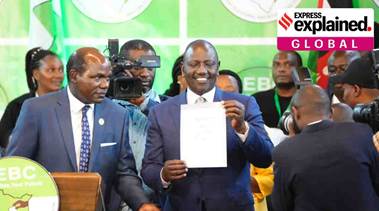Description

Copyright infringement is not intended
Context: Despite receiving the support of incumbent President Uhuru Kenyatta and leading in opinion polls, the veteran Raila Odinga lost narrowly to Deputy President William Ruto.
Concerns:
- Odinga has rejected the result as “null and void”, and is expected to appeal in the Supreme Court. Four of the seven election commissioners have dissociated themselves from the result.
- Kenya, which has a history of post-election violence, is on tenterhooks — hoping that the matter would be settled in court rather than on the streets.
- In 2007, rioting and strikes followed the announcement that Odinga had lost to Mwai Kibaki. In 2017, police used deadly force against opposition supporters protesting the victory of Kenyatta.
- To keep his country together will be Ruto’s first challenge. Africa, and the world as a whole, could do without a meltdown in Kenya.
- The country is in transition, with a different tribal and class coalition, and new kinds of engagement. Expectations are high among younger citizens of Africa’s sixth largest economy — but Kenya’s debt is 67% of its GDP, and the country received a 38-month, $2.34 billion IMF finance package in April 2021.

An important nation
- Ruto does not have the stature of the outgoing President, a senior African regional leader who largely kept his deputy in his shade. As President, Ruto will have to build relationships with other leaders in the region, and effectively leverage Kenya’s position of influence.
- Two, under Kenyatta, Kenya pursued a close economic partnership with China while aligning itself strategically with the United States, which included criticising Russia. Both the Chinese and Russians are expected to aggressively woo Kenyatta’s successor. As a member of the 23-nation Indian Ocean Rim Association (IORA), Kenya is a strategically important player in the Indian Ocean region.
- Kenya is currently a non-permanent member of the UN Security Council. During its rotational presidency of the UNSC in October 2021, Kenya took initiatives including dealing with issues of regional conflict, and acceptance of diversity to prevent conflicts. Kenya has promoted coordination among African and Caribbean representatives, and as a member of the Peace and Security Council of the African Union, played a role in resolving conflicts on the continent.
- Kenya is the economic locomotive of the region, involved in 45% of the trade within the East African Community (EAC). It was instrumental in expanding the EAC just before Kenyatta gave up chairmanship in July — the community admitted the Democratic Republic of the Congo (DRC), the largest country in central Africa. This took the EAC to the port of Matadi on the Congo river in the DRC, and established the vision of a cross-continent link between the Indian and Atlantic Oceans.
- Horn of Africa remains a tinderbox. Among the earliest to congratulate Ruto were Ethiopia’s Prime Minister Abiy Ahmed, and both the past and present Presidents of Somalia. This was interesting, because Ethiopia, Eritrea, and Somalia had tried to unseat Kenya from its traditional position of influence in the Inter-Governmental Authority on Development (IGAD), the eight-nation East African trade bloc.
- Ruto’s foreign policy inclinations are not clear. He did not have much responsibility as Kenyatta’s deputy. For now, he is likely to concentrate on stabilising domestic politics, in fulfilling promises he made to the people, and in balancing the coalition that he has creatively established. Africa needs a stable and steady Kenya.
https://indianexpress.com/article/explained/explained-global/kenya-elections-william-ruto-victory-explained-8096305/










